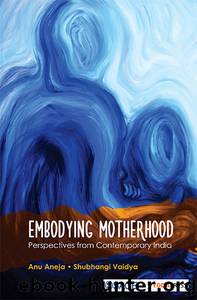Embodying Motherhood by Aneja Anu Vaidya Shubhangi

Author:Aneja, Anu,Vaidya, Shubhangi
Language: eng
Format: epub
Publisher: Sage Publications India Pvt, Ltd -- eBooks
4
âMore than a Motherâ:
Autism, motherhood
discourse and lived
experience*
Introduction
The over-determined construction of the mother as a repository of unquestioning devotion and the source of unending care becomes particularly salient in the context of mothering a child with a developmental disability. Across cultures, the central role attributed to the mother in determining the developmental pathways of her child results in the mother often being blamed for her childâs atypical or non-normative development. There is a powerful discourse of mother-blaming that stigmatizes the supposedly neglectful, self-centred mother, especially if she happens to be a professionally qualified, working one. This is particularly the case in the context of challenging disorders like autism, which impact the core capacities of language, communication and sociality that define and establish competent personhood and being âhumanâ. Autism is a complex neurobehavioural disorder that includes impairments in social interaction, developmental language and communication skills combined with rigid, repetitive behaviours. It ranges in severity from a mild condition that somewhat limits an otherwise normal life to a devastating disability that may require life-long or institutional care.1 A âspectrum disorderâ, its manifestations vary from severely withdrawn, non-verbal children who seem to shun human contact to extremely talkative yet naive individuals who often behave very inappropriately in social situations.
Ever since autism was identified as a distinct disorder by the Austrian psychiatrist Leo Kanner in 1943, the condition has been inextricably linked to faulty mothering. The term ârefrigerator motherâ, coined by Kanner and taken to an extreme by scholars and practitioners like the University of Chicago professor and well-known writer Bruno Bettelheim, became an epithet that blamed and stigmatized a whole generation of autism mothers in the West, who were seen as lacking in the ânaturalâ maternal capacities of love and nurturance, and were thus responsible for the withdrawal of the child into his/her inner world. While many mothers bore the brunt of this label, others actively challenged and contested it. Their critiques and experiential accounts provided correctives to the prevalent âexpertâ theories and professional practices. Social policy academic and autism mother Mary Langan (2011, 194) observes that the âdistinctive contribution of parental voices to the emerging discourse about autism... has received remarkably little attention.â However, recent works tracing the history and evolution of autism address the pivotal role played by parents in influencing the autism discourse. (Grinker, 2007; Feinstein, 2010; Silverman, 2012)
The growing salience of autism as a diagnostic category across the world in recent years has been driven by the globalization of western bio-medical and psychiatric discourses and the availability of information on the internet and other technologies. While the refrigerator mother concept had a specific socio-historical context and genealogy, mother-blaming emanates from cultural understandings of âgoodâ and âbadâ mothers, and thus, mothers across the world are made to feel responsible for their childâs disability in specific, gendered ways. Autism mothers across the world, including India, have been at the forefront in creating and disseminating awareness about the condition, creating networks for mutual support and public understanding, challenging the hegemony of the medical
Download
This site does not store any files on its server. We only index and link to content provided by other sites. Please contact the content providers to delete copyright contents if any and email us, we'll remove relevant links or contents immediately.
The Silent Cry by Cathy Glass(1177)
A Terrible Secret by Cathy Glass(976)
Advice for Working Moms (HBR Working Parents Series) by unknow(869)
For Laci by Sharon Rocha(688)
The End of Trauma by George A. Bonanno(688)
A Radical Awakening by Shefali Tsabary(627)
It's All About Him by Denise Jackson(610)
Alpha Couples: Build a Powerful Marriage Like a Boss by Solano Robert(605)
Let Me Go by Casey Watson(593)
The Tapping Solution for Parents, Children & Teenagers: How to Let Go of Excessive Stress, Anxiety and Worry and Raise Happy, Healthy, Resilient Families by Nick Ortner(569)
Linda Goodman's Love Signs by Linda Goodman(560)
The AfterGrief by Hope Edelman(557)
The Working Mother Ultimate Guide to Working From Home by Working Mother Magazine(557)
Getting It by Allison Moon(538)
Somebody's Daughter: A Memoir by Ashley C. Ford(532)
Nobodyâs Son by Cathy Glass(531)
American Baby by Gabrielle Glaser(529)
Turn Autism Around by Mary Lynch Barbera Ph.D(524)
Hell Is Other Parents by Deborah Copaken Kogan(519)
